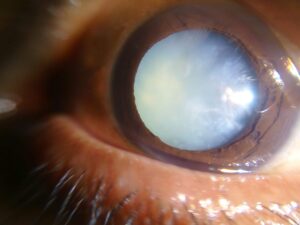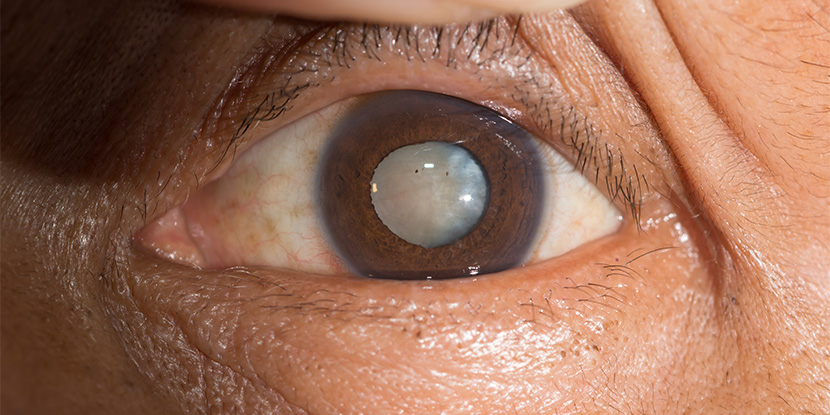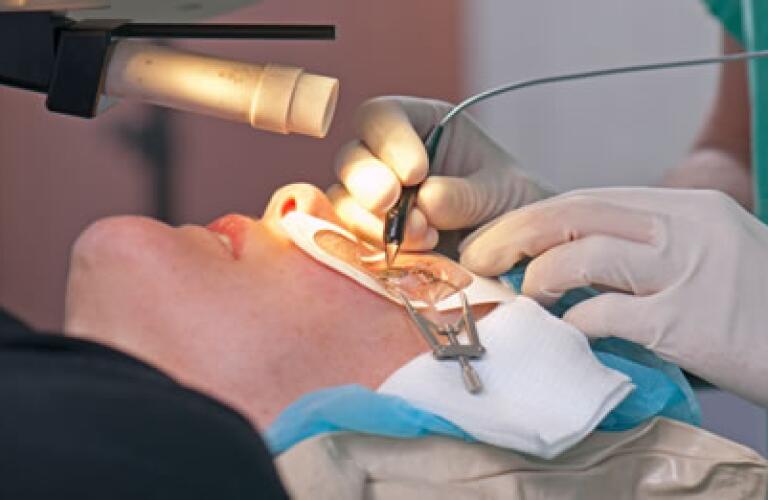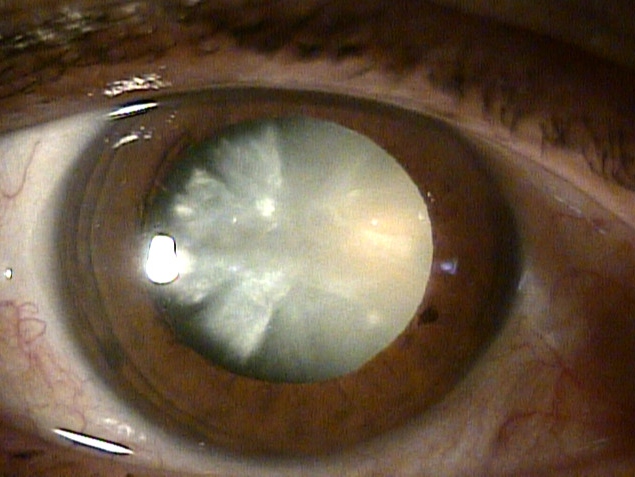A cataract is a clouding of the eye’s natural lens. It can occur in one or both eyes and usually develops slowly over time. A cataract can eventually lead to blindness if left untreated. There are different types of cataracts, and one type is known as a dense cataract. In this article, we will guide you on everything you need to know about dense cataracts; from symptoms to treatment options, read on to learn more.
What is a Dense Cataract?

A dense cataract is a type of cataract that is characterized by a high density of lens proteins. This results in a clouding of the lens, which can lead to vision problems. Dense cataracts are usually more challenging to treat than other types of cataracts.
Dense cataracts can cause several vision problems, including blurry vision, difficulty seeing at night, and trouble seeing colors. Treatment for dense cataracts typically involves surgery to remove the clouded lens and replace it with an artificial one.
Types of Dense Cataracts
There are three types of dense cataracts: nuclear, cortical, and posterior subcapsular.
Nuclear cataracts form in the nucleus, or center, of the lens. They are usually seen first in older adults and are the most common cataract.
Cortical cataracts form in the cortex, or outer layer, of the lens. They often begin as white opacities that spread from the outside edge of the lens toward the center.
Posterior subcapsular cataracts form near the back surface of the lens. They can develop at any age but are more common in people who take certain corticosteroid medications or have had an eye injury or inflammation.
Symptoms of Dense Cataracts
Several symptoms may indicate you have a dense cataract, including:
1. Blurry vision: This is the most common symptom of a cataract, and it can happen gradually or suddenly. You may notice that your vision is not as clear as it used to be, or that objects appear fuzzy or distorted.
2. Difficulty seeing at night: If you have a dense cataract, you may have trouble seeing at night or in low-light conditions. This can make driving or other activities that require good night vision more difficult.
3. Glare and halos around lights: You may notice that bright lights seem to be more bothersome than they used to be. This glare can make it difficult to see clearly, especially when you’re trying to read or drive. You may also see halos around lights, which can be particularly troublesome at night.
4. Change in color perception: A dense cataract can cause colors to appear faded or yellowed.
5. Double vision: In some cases, a dense cataract can cause double vision (diplopia). This happens when the lens of the eye is no longer able to focus light properly on the retina, resulting in two images being projected onto the back of the eye instead of one.
6. Frequent prescription changes: If you have a dense cataract, you may find that your eyeglass or contact lens prescription needs to be changed more often than it used to.
7. Difficulty with fine details: A dense cataract can make it difficult to see small details or print. This can make reading or doing other tasks that require good vision more difficult.
If you have any of these symptoms, talk to your eye doctor about whether you may have a cataract and if surgery is necessary.
Risk Factors for Dense Cataracts

There are several risk factors for developing dense cataracts, including:
Age
One of the most common risk factors for dense cataracts is age. Most people develop cataracts as they get older and this risk increases significantly after the age of 60. As we age, changes in the eye’s lens can lead to clouding and make it more difficult to see clearly. Also, as you age your eyes may produce less of a protein called crystallin that helps keep the lens clear. Other risk factors such as diabetes and high blood pressure can also affect cataract formation, especially if present before the age of 50.
Diabetes
Diabetes is another common risk factor for dense cataracts as well as other vision problems like diabetic retinopathy (eye disease caused by diabetes), glaucoma (free glaucoma surgery), and macular degeneration which can all cause significant vision loss or blindness. Diabetic patients are also at a higher risk for developing nuclear cataracts which tend to progress more rapidly than other types of cataracts.
Hypertension (high blood pressure)
Hypertension (high blood pressure) is a significant risk factor for many types of eye disease including glaucoma, diabetic retinopathy, and macular degeneration. There is evidence that hypertension may play a role in the development of dense cataracts as well. High blood pressure can damage the blood vessels in the eye, leading to vision problems and other eye diseases. (Visit here for effective online hypertension treatment).
Medical Conditions
Several medical conditions have been linked to an increased risk of developing dense cataracts. These conditions include diabetes, hypertension, cardiovascular disease, and age-related macular degeneration. People with these conditions are more likely to develop cataracts at an earlier age and cataracts tend to progress more rapidly.
Smoking
Smoking is a significant risk factor for many types of eye disease including age-related macular degeneration, diabetic retinopathy, and glaucoma. There is also evidence that smoking may play a role in the development of dense cataracts as well.
Diagnosing Dense Cataracts
Diagnosing dense cataracts can be difficult, as they often do not cause any symptoms in the early stages. If you experience any changes in your vision, it is important to see an eye doctor for a comprehensive eye examination.
During an eye exam, your doctor will assess your vision and look for any changes in the appearance of your eyes. They will also check for any signs of cataracts, such as cloudiness or yellowing of the lenses.
If you are diagnosed with a dense cataract, your doctor will likely recommend surgery to remove the affected lens. Surgery is usually successful in restoring clear vision. In some cases, you may need to wear glasses or contact lenses after surgery to improve your vision.
Treatment for Dense Cataracts

Assuming that by “dense cataracts” you mean nuclear sclerosis, the most common type of cataract, there are a few different ways to treat it.
The first way is to do nothing and simply wait for the cataract to mature. This usually takes several years and eventually, the vision will be so impaired that surgery will become necessary.
The second way is to have surgery sooner than later. This can be done either with traditional cataract surgery or with laser-assisted cataract surgery (LACS). With traditional surgery, an incision is made in the eye and the cloudy lens is removed. LACS uses a femtosecond laser to make the incisions and remove the lens. While both methods are effective, LACS has a lower risk of complications.
Medications
An alternative to surgery is to use medications that can help to delay or prevent the progression of cataracts. These include:
Antioxidants: Furthermore, These can help to protect the eye from oxidative damage, which is thought to contribute to the formation of cataracts.
Vitamins C and E, as well as beta-carotene, are all antioxidants that have been studied for their ability to prevent or delay cataracts.
Anti-inflammatory drugs: Inflammation is also thought to play a role in the development of cataracts. Non-steroidal anti-inflammatory drugs (NSAIDs), such as ibuprofen, have been shown to reduce the risk of developing cataracts.
Corticosteroids: These are a type of anti-inflammatory drug that can be used to treat inflammation in the eye. They are typically only used when other methods have failed.
Surgery is the most effective way to treat cataracts, but medications can help to delay or prevent their progression.
Diet
A healthy diet is important for maintaining good vision. A diet that is high in antioxidants, vitamins, and minerals is protective against many types of eye disease including cataracts, macular degeneration, and glaucoma. Antioxidants help to protect the eyes from damage caused by free radicals. Vitamins and minerals are important for maintaining healthy vision. If you have a dense cataract, talk to your eye doctor about your treatment options.
How to Prevent Dense Cataracts?

Preventing cataracts is mostly about protecting your eyes from damage. To do this, you should:
Wear sunglasses when outdoors.
One of the most common causes of cataracts is exposure to sunlight. The ultraviolet rays in sunlight can damage the proteins in your eye’s lens, causing them to clump together and form a cataract.
Wearing sunglasses when you go outdoors can help protect your eyes from this type of damage. Make sure to choose sunglasses that block out both UVA and UVB rays.
Stop smoking.
Smoking is a major risk factor for cataracts. If you smoke, quitting is the best way to reduce your risk. If you can’t quit, try to cut back on how much you smoke each day.
Eat a healthy diet.
Eating a diet that’s high in fruits and vegetables may help reduce your risk of developing cataracts. Some studies have shown that people who eat a lot of antioxidant-rich foods have a lower risk of developing cataracts than those who don’t.
Antioxidants are substances that help protect your cells from damage. They’re found in many fruits and vegetables, including:
- blueberries
- spinach
- kale
- oranges
Wear safety glasses when engaging in activities where there is a risk of eye injury.
When you’re doing activities where there’s a risk of eye injury, such as playing sports or working with power tools, be sure to wear safety glasses to protect your eyes.
Have regular eye exams.
If you have diabetes, high blood pressure, or another condition that increases your risk of cataracts, be sure to see your doctor for regular eye exams. These exams can help catch cataracts early when they’re easier to treat.
Conclusion
Dense cataracts tend to develop gradually over time, and they eventually interfere with your ability to see. If you think you might have a dense cataract, be sure to see your doctor right away so that you can get the treatment you need. With proper medical care, you can protect your vision and maintain your quality of life.
Cataract surgery is a safe and painless procedure. At EyeMantra we have a team of experienced eye surgeons, who will be happy to answer any questions on cataract surgery, cataract surgery cost, cataract lens cost for different cataract surgery types- Phacoemulsification, MICS & Femto Laser Cataract. Call us at +91-9711116605 or email at eyemantra1@gmail.com for inquiries. We also provide effective Glaucoma surgery, Retina Surgery.
You can also visit our branch- Eye Hospital in Paschim Vihar, Eye Hospital in Rohini


